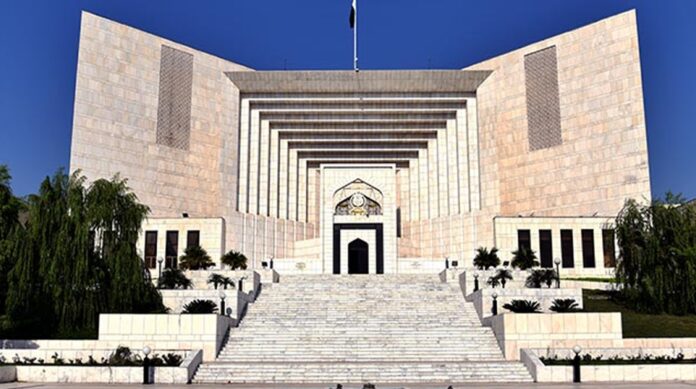Supreme Court Justice Jamal Khan Mandokhail on Thursday questioned the legality of subjecting civilians to the disciplinary framework of the armed forces during a hearing of intra-court appeals challenging military courts’ decisions.
A seven-member constitutional bench, led by Justice Aminuddin Khan and including Justice Mandokhail, Justice Muhammad Ali Mazhar, Justice Syed Hasan Azhar Rizvi, Justice Naeem Akhtar Afghan, Justice Musarrat Hilali, and Justice Shahid Bilal Hassan, presided over the case.
Also Read: Ex-ISI Chief Faiz Hameed charged for Political Involvement and Abuse of Power: ISPR
Senior lawyer Khawaja Haris, representing the federal government, argued that the cases pertain to Article 8 of the Constitution. However, Justice Mandokhail raised significant concerns, asking, “How can a civilian, who is not part of the armed forces, fall under its disciplinary code?” Drawing a comparison, he said, “Just as agricultural workers follow their departmental code, how does the armed forces’ code apply to civilians?” Haris responded, stating that if permitted by law, such discipline could be applied.
Justice Musarrat Hilali highlighted the lack of access to FIR copies for civilians detained under military custody, while Justice Mazhar questioned how a previous bench determined that the Army Act conflicted with Article 8.
Advocate Haris clarified that under certain conditions, civilians could fall within the jurisdiction of the Army Act and argued that courts lack the authority to nullify its provisions. He also asserted that military trials uphold the right to a fair trial under Article 10-A.
Justice Mandokhail further queried whether the Army Act overrides Section 1 of Article 8 of the Constitution and asked if merely planning incitement could bring civilians under its jurisdiction. He questioned whether fundamental rights could be curtailed for civilians not explicitly subject to the Army Act.
Justice Hilali sought clarity on whether military courts provide legal counsel and evidence to the accused. Haris confirmed that both legal representation and access to relevant materials are ensured.
The bench also discussed jurisdictional boundaries. Justice Mandokhail noted that attacks on locations like the President’s House would typically fall under anti-terrorism courts, to which Haris responded that this was decided through legislation.
In a hypothetical scenario posed by Justice Mandokhail, he asked where a trial would occur if a soldier murdered an officer. Haris replied that such a case would be tried in a regular court. Justice Mandokhail further questioned how civilians, not subject to the Army Act, could be deprived of their constitutional rights.




